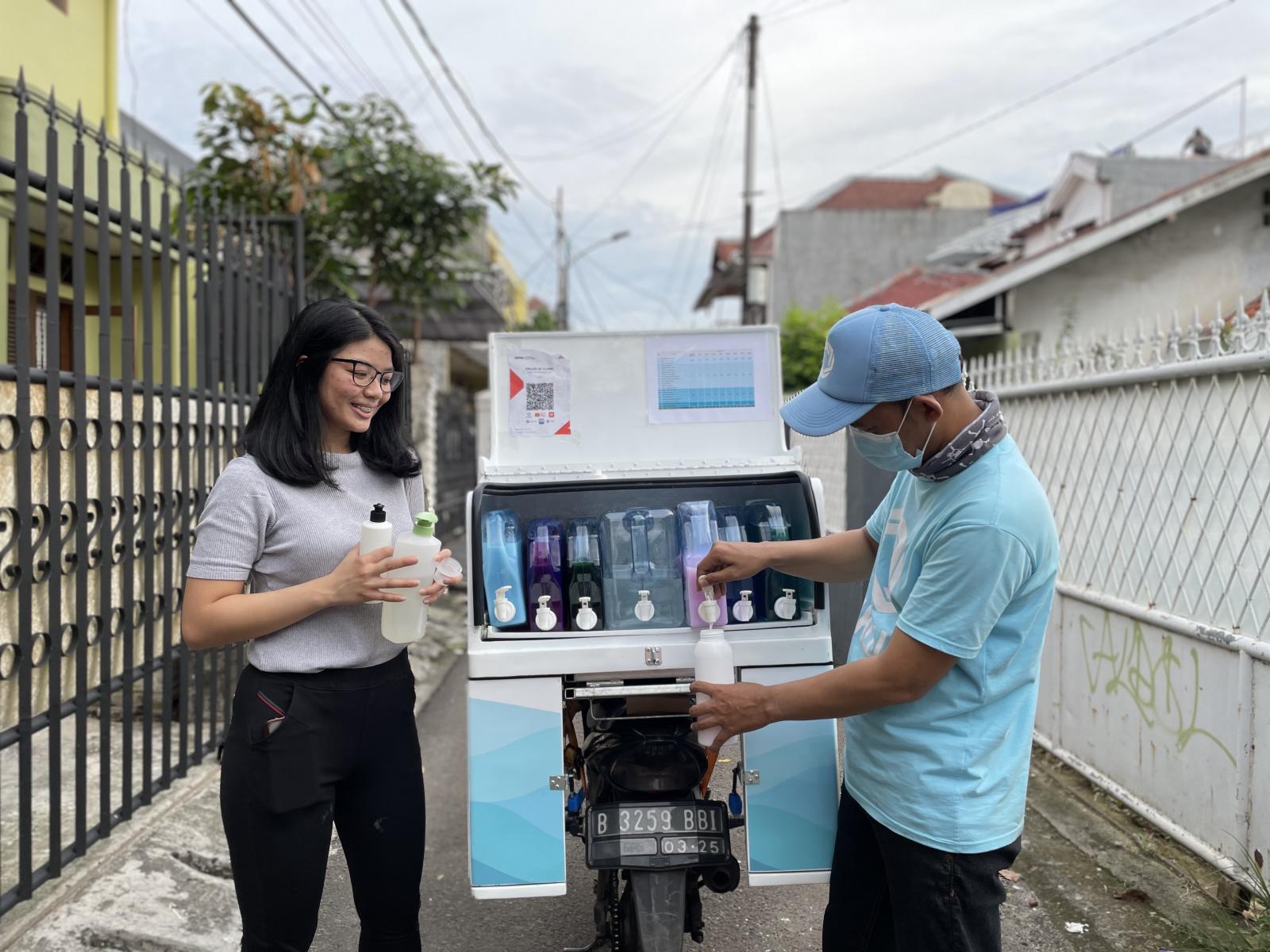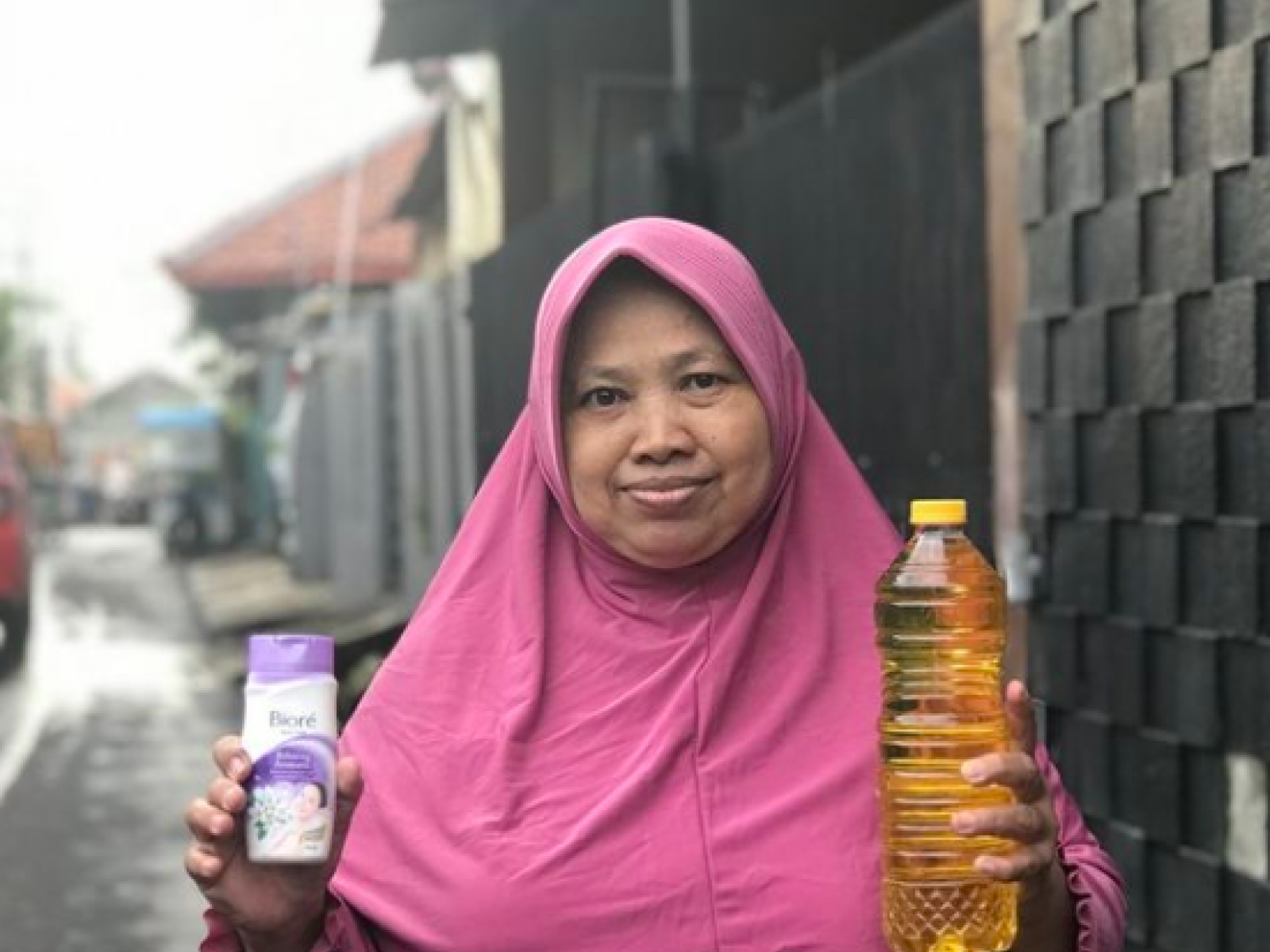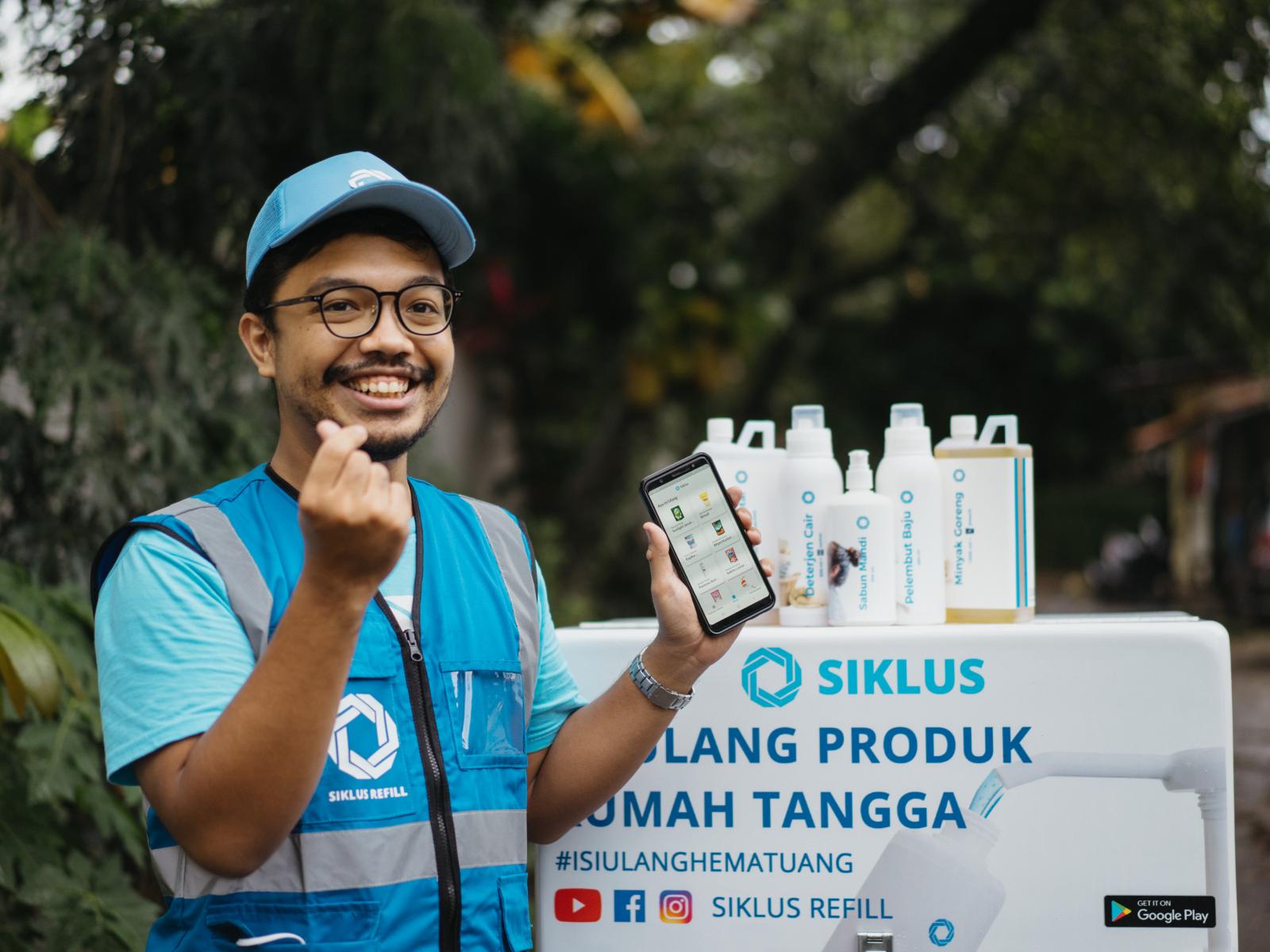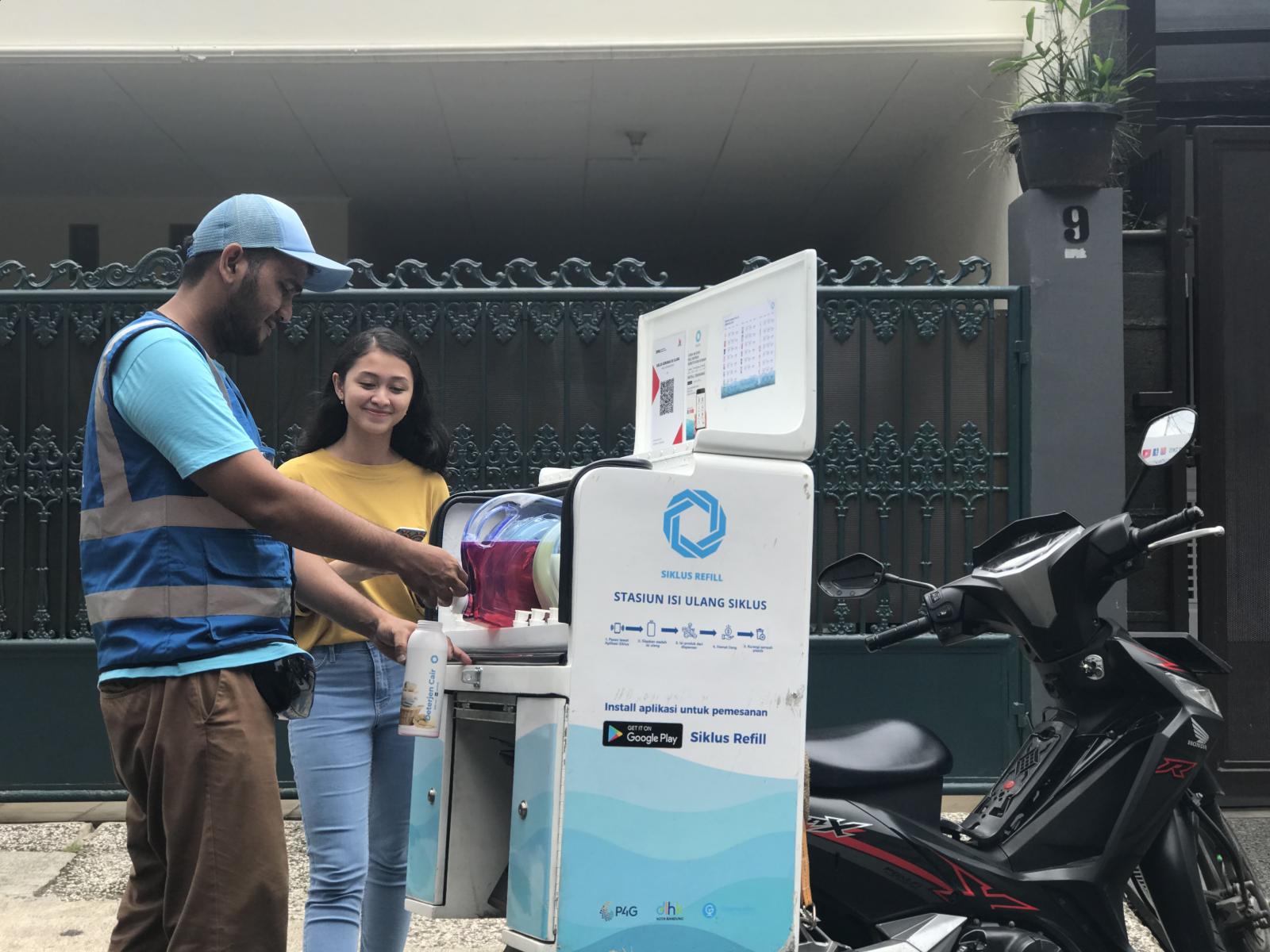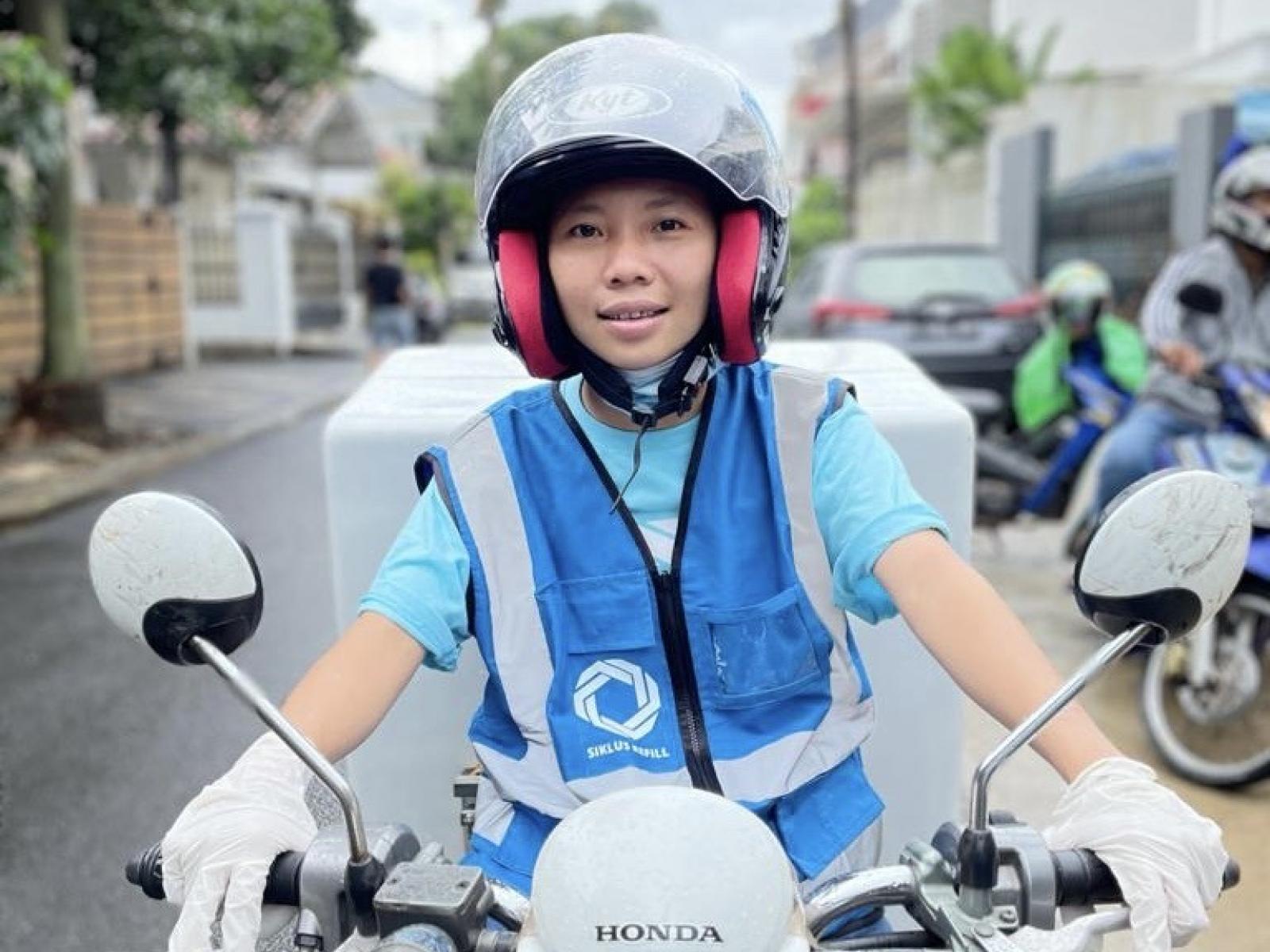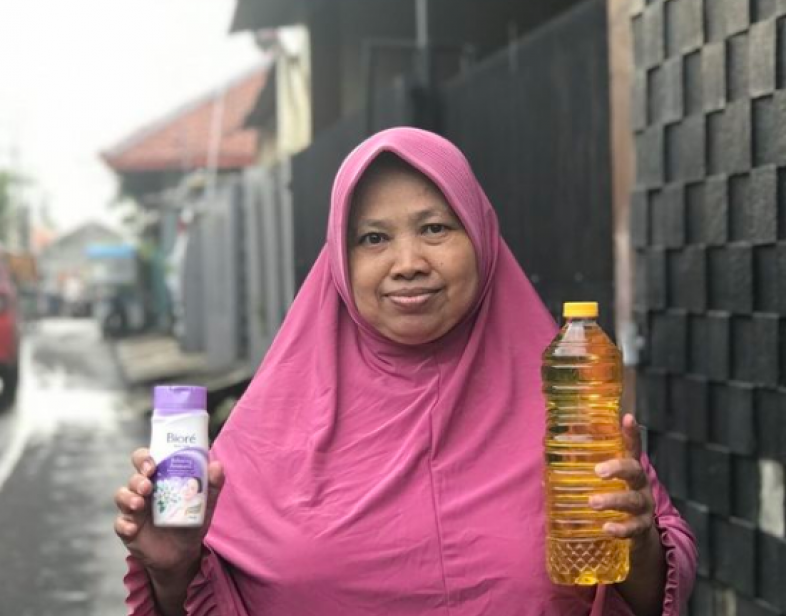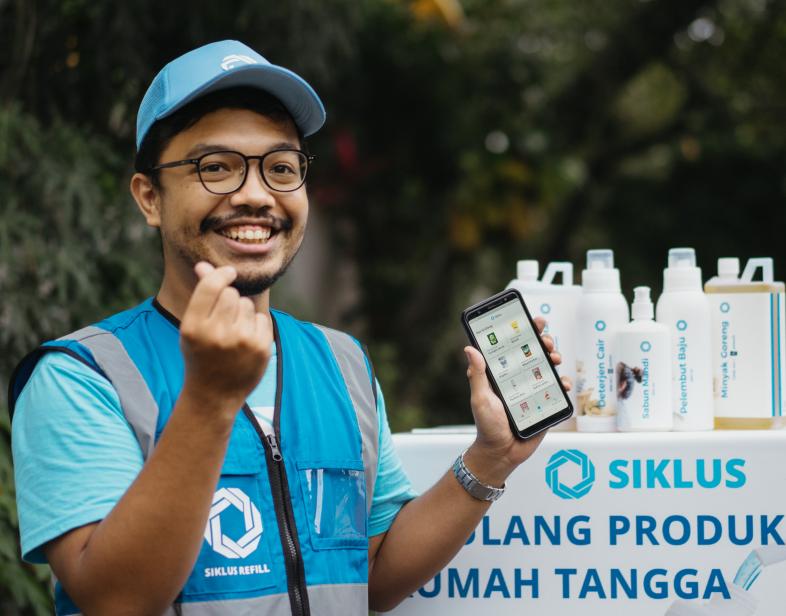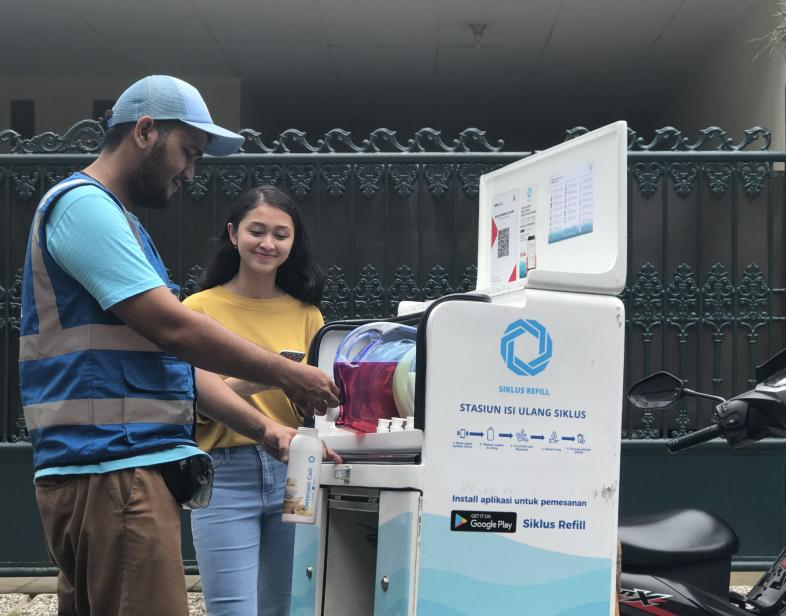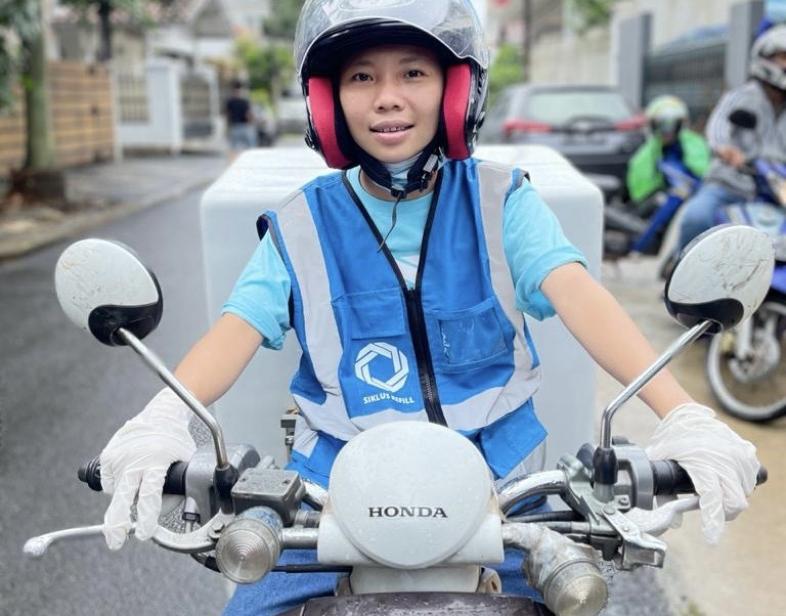An Overview Of Our Solution
Siklus is reinventing the future of retail by delivering refills of everyday needs to door - without plastic waste. Customers can order our refill bikes via our app or WhatsApp at their doorstep and use their own containers to refill detergent, shampoo, cooking oil and more at a lower cost. We use technology to dispense safely and precisely, to optimize our supply chain and allow brands to interact with their customers. Our model allows 10-50% cost savings for customers by eliminating the cost of single-use packaging thereby giving them a feasible option to change their behavior to be more sustainable.
- Population Impacted: 30,000
- Continent: Asia
First name
Last name
Organization type
Context Analysis
Indonesia is the second-largest ocean plastic polluter in the world. The most common items found on its beaches are plastic wrappers and single-serving sachets (Ocean Conservancy, 2017) that are not recyclable. Every 20 minutes, the equivalent of a 10 tons truckload of plastic is dumped into the waters around Indonesia (World Bank, 2018). The effects of the plastic crisis are compounding with decades of plastic waste polluting our oceans, and it is urgent to avert the crisis now.
Out of financial necessity, 70% of Indonesians buy their household goods in single-serving sachets rather than in bulk. As 15% of the sachet cost comes from packaging, low-income populations often pay extra for their everyday needs in small portions, a so-called "poverty tax.” Yet, low-income populations are trapped in this unfavorable consumption pattern due to cash constraints, and a need to control their portion size with small dosed sachets.
Describe the technical solution you wanted the target audience to adopt
We set up bikes retrofitted with our refill stations, and customers can use an app or WhatsApp to order it to their doorstep. Then customers can bring their own containers to refill everyday needs. The dispensing technology is safe, precise, fast, and tamperproof and thus enables the sales of FMCG products as refills by overcoming the issues of hygiene, dosing, and tampering.
Customers can bring their own containers or purchase reusable containers from us. These are designed to suit the needs of low-income customers. They often buy strips of sachets in order to dose easily while conventional bottles lead to overuse of the product. Further, we visually educate customers on the price difference of buying in sachets vs. refills/large sizes which is often not apparent to them.
Through our solution, we achieve a win-win solution for both our low-income customers, sellers, FMCG companies, and the environment.
Describe your behavioral intervention.
We offer convenience and price. We are able to be 10 - 50% cheaper per unit as we buy in bulk, and we provide the convenience of door delivery. This makes us affordable and attractive to the mass market.
Our main target markets are low-income and middle-income families who are purchasing sachets because of their financial necessities and limitations. Our model enables a an average 20% discount to our price-sensitive customers. By implementing behavior change from purchasing sachet to refill system, a family of 5 can save up between up to $40 a year, which is the equivalent of 8 days worked at minimum wage.
Our customers, especially women bearing additional household burdens during the pandemic, find our mobile refill model convenient for them since they can get their consumer goods delivered to door.
Behavioral Levers Utilized
As needed, please explain how you utilized the lever(s) in more detail.
Material incentives: We make the price savings as compared to sachets very clear to our customers. Using our app, our existing customers can monitor how much money saved and the impact made by shifting to refill system provided by Siklus.
Social influences: To further accelerate behavior change, Siklus also work alongside local community leaders and local “influencers” to advocate the innovation and plastic problem that Siklus is trying to tackle. This creates a positive peer pressure to be part of the solution, rather than part of the problem.
Describe your implementation
Distribution model: Siklus provides a sustainable alternative to sachets through our refill stations. Mobile dispensers are motorbikes retrofitted with our proprietary dispensing technology. These stations deliver refills of everyday needs on demand to middle to lower-income neighborhoods. We are currently catering the Greater Jakarta area. We offer refill service for essential products at 10% discounts by eliminating the production cost of single-use plastic packaging (giving sachet customers up to 50% discount). We sell homecare and personal care products as well as selected food items. We also offer reusable containers that are designed for purpose and convenience.
Partners: We have partnerships and upcoming with major FMCGs including Nestle, P&G, RB, Wings, and Sungai Budi, who supply their products in 5 - 25l jerry cans to us in a circular system.
Adoption: We have seen 15% Week on Week growth (organically) this year since we launched our bike delivery model in January. We have high customer retention, and an extremely high customer advocacy - particularly through customers sharing their experience on social media, as well as through customers organizing group buying.
Challenges: Our key challenges have been in the area of hardware development, since this is quite a lengthy and cost intensive process, yet necessary in order to scale up the process. Furthermore, our operations have been quite heavy, and so we are currently piloting with third party logistics companies to make our supply chain and distribution more scaleable.
Key success factors: Key success factors and enabling conditions are the readiness of FMCGs to switch to this model, as well as the fact that the Indonesian government is phasing out sachets by 2030. Further, COVID has brought a willingness to switch to home delivery and contactless retail models, which we offer.
Describe the leadership for your solution. Who is leading the implementation?
We have a diverse team who passionate about the impact we create, and is driven to be the next, sustainable model of retail.
- Jane von Rabenau, CEO & Founder is Harvard and LSE graduate with a professional background is at the intersection of behavioral economics and international development.
- Didit Dwianto, our Head of Engineering, comes with over 15 years of experience and has previously built teams up from 3 to 36 engineers
- Adrian (AJ) Lee, Head of Marketing and Partnerships, was MD at various international agencies and exited two companies
- Laksamana Sakti, our Head of Operations, is a former management consultant in EY Consulting with expertise in operations and strategy
- Yusuf Syaid, our Head of Hardware, has 18 years of experience in building Hardware and was CTO of Gojek-backed start-up Zulu
Additionally, we are backed by connected investors, including the VC Teja Ventures and several angel investors from the C-suite of GoJek, one of Asia's largest unicorns.
Share some of the key partners or stakeholders engaged in your solution development and implementation.
Our ambitious goal is to reinvent the way retail is done and create the next generation of retail. It is hard to achieve this alone since we are disrupting a system that has been established for decades and thus needs collective action. To scale, Siklus needs to work with its main stakeholders in the retail industry,including FMCG companies.
So far, we have partnerships with P&G, Nestle, RB, Sungai Budi, Total Chemindo (the sister company of Indonesia’s largest supermarket network), and Wings (Indonesia’s largest homecare FMCG), and Lion Wings.
More importantly, we are working with local leaders and influencers, such as Quran reading groups, local government leaders, community leaders, and saving groups. We have a partnership with Jakarta’s largest network of community saving groups and hav endorsement for the Environmental Agency of Jakarta and the National Ministry of Planning.
Video file
Who adopted the desired behavior(s) and to what degree? Include an explanation of how you measured a change in behavior.
Primary behavior change is to buy products in refills instead of plastic packaging. Since none of the products we sell are available as refills elsewhere, we link this directly to sales.
The secondary behavior change is an increased awareness of the environment and other pro-environmental behavior such as littering, using reusable water bottles, etc. Currently, we are not measuring this due to limited bandwidth, but we hope to measure this in future using self-reporting and experimental methods.
How did you impact water pollution? Please be specific and include measurement methodology where relevant.
We measure our impact by calculating the plastic waste and plastic leakage aversion.
- Plastic waste averted
Plastic waste is prevented from entering the system by cutting out single-use packaging. This will result in less strain on the waste management system, less plastic being burnt, and less plastic polluting the environment.
Plastic waste averted = (# refills sold) - (container waste)
Within the first 5 years of operation, we expect to save 600M sachets or single-use packages being used.
- Plastic leakage averted
We prevent ocean plastic from entering the ocean. We will target communities with low waste collection rates as well as low-value plastics which disproportionately ends up polluting as there is no incentive to recycle it.
Plastic waste averted from leaking to ocean = (# refills sold x regional leakage rate) - (container leakage)
With assumption of 25% ocean leakage rate, we expect to avert 150M plastic waste from entering the ocean.
How has your solution impacted equity challenges (including race, gender, ethnicity, social class/income, or others)?
First and foremost, the mobile model is making shopping more accessible to people with disabilities and elderly by bringing consumer goods conveniently directly to their doorstep. Our allow customers with disabilities or older customers to purchase products more conveniently: Sachets and pouches are harder to open and use, and squeeze products out than a bottle.
Additionally, our solution increases the purchasing power of low-income customers. By providing more affordable products, we are addressing the disproportionate impact of plastic waste and “poverty tax” that affects the most vulnerable populations in Indonesia.
What were some social and/or community co-benefits?
Anecdotal reports have shown that we not only directly reduce plastic waste through our intervention, but we also indirectly led to a higher awareness around plastic waste and reduced littering.
What were some environmental co-benefits?
Siklus’ solution will benefit all others living in our operational area due to the environmental benefits of reduced plastic waste. Siklus can help lower the risk of widespread flooding, which resulted in a loss of $70 billion annually (Central Bank of Indonesia, 2020), mainly caused by environmental damage & waste dumping, & reduce the risk of respiratory diseases caused by trash burning that can lead to 44,000 fatalities & economical loss of $11billion annually (Greenpeace, 2020).
What were some sustainable development co-benefits?
With our model, we achieve a win-win solution for our customers, partners, and the environment. We will give our target market (95% of our customers are women aged 25-50) access to popular necessities at a cheaper price by eliminating packaging cost without generating more plastic waste in the process. Our customers, especially women bearing additional household burdens during the pandemic, find our mobile refill model convenient for them since they can get their consumer goods delivered to door
Video file
Sustainability: Describe the economic sustainability of your solution.
In the first year of commercial launch, we own and operate all dispensing technology and mobile refill carts. Now, we are working on partnerships with third party logistics providers. Here, we act as the provider of the refill system, help with the initial outreach and marketing, and connect to the FMCGs. With time and performance, our aim is to create a partnership with distributors to allow us to reach a larger scale faster.
We partner with FMCG companies as our supplier where we buy the products without packaging in jerry cans at discounted price. This is achieved through cost reduction for FMCGs by exploiting the arbitrage between products sold in sachets and products sold in bulk; and reducing their packaging costs.
Return on investment: How much did it cost to implement these activities? How do your results above compare to this investment?
Last year we raised an angel round of US$ 200k which allowed us to build a team, develop two mobile apps (customer and seller), and create prototypes of our dispensing technology, and have 25 refill stations running. We recently raised our pre-seed round and are looking to raise a seed round soon in order to further commercialize our technology and scale our model, and hope to run completely on revenues in the next 24 months.
How could we successfully replicate this solution elsewhere?
The most prominent example is Algramo, a Chilean company, that sells consumer products as refills through refill vending machines, and has over 2,000 stations running, and expanding to several other countries. Further, there is Milk ATMS, a company in Kenya selling milk and oil as refills to low-income customers.
The model is very scalable, but since Indonesia is the second-largest ocean plastic polluter and a huge economy of 280 million people, our immediate focus is on scaling across Indonesia.
